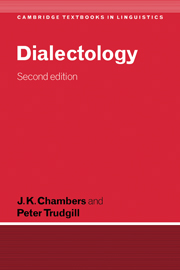3 - Dialectology and linguistics
Published online by Cambridge University Press: 05 June 2012
Summary
Dialectology is to some extent an autonomous discipline, with its own goals and methods. In the previous chapter, we reviewed the most distinctive aspects of dialect geography. But we also noted its common ground with other branches of linguistic science, especially phonetics, historical linguistics and sociolinguistics. In this chapter, we look more closely at the relationship between dialectology and general linguistics.
Modern dialectologists are usually trained as linguists, and many of them contribute to the literature on phonology or syntax or other branches as well as to dialect studies. Obviously, detailed descriptions of peripheral and secondary dialects are directly relevant to theories of phonology and grammar. It is perhaps surprising, then, to discover that interchanges between dialectologists and theoretical linguists are not as common as they might be, though in recent years both groups have come to realise that the rich variability of linguistic systems can illuminate and challenge universal claims about grammar and phonology.
Dialectology took its impetus partly out of the desire to illuminate and challenge Neogrammarian principles in the nineteenth century, as we noted in 2.1 above. We begin this chapter with a closer look at the relationship between dialectology and philology, and then move on to discuss its relationship with some other important theoretical frameworks.
Dialectology and philology
Wenker's original work on German dialects was motivated in part by the claim, new at the time, made by scholars working on the history of languages, that sound change was regular.
- Type
- Chapter
- Information
- Dialectology , pp. 32 - 44Publisher: Cambridge University PressPrint publication year: 1998
- 1
- Cited by



